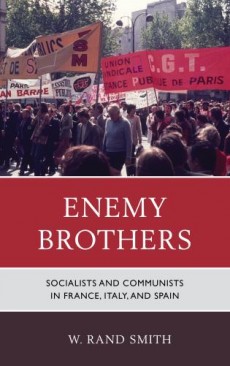Leftist infighting examined in new book by Rand Smith
 "Enemy Brothers" by Rand Smith is published by Rowman & Littlefield Publishing Group, Inc.
"Enemy Brothers" by Rand Smith is published by Rowman & Littlefield Publishing Group, Inc.
Enemy Brothers: Socialists and Communists in France, Italy, and Spain was published in November 2012.
Add Italian to the list of languages (along with Spanish, French, and, of course, English) in which Professor of Politics W. Rand Smith is conversant, thanks to the months of participatory research he did in Italy for his latest book on politics in Western Europe. Published this month, Enemy Brothers: Socialists and Communists in France, Italy, and Spain (Rowman & Littlefield Publishers) compares the inner workings of the leftist parties of those countries between 1920 and 2010.
“I think of studying politics as a process of cultural discovery,” Smith says. “I like to ‘do’ comparative politics by living in a place and learning the language in order to ask people what they think.” Smith has done that three times in his career: first in France in the 1970s, in Spain in the 1990s, and most recently in Italy since 2005. For this project, Smith attended union and political party meetings and spoke to union leaders, politicians, and scholars in all three countries. By delving into the culture in this way, he was able to discern contrasting patterns of division and cooperation among leftist parties that have shaped political outcomes in each nation.
“I’ve been intrigued for a long time by the split between the two main branches of the European Left, the Socialists and the Communists,” Smith says. “I saw this first-hand decades ago during my dissertation research on the French labor movement. At the factory level, unions affiliated with each of these parties fought each other as much as they did management.” Extending his research to Spain and Italy, Smith found that the two parties’ relationship is not always one of contention; there are also periods of partnership.
His book seeks to identify and explain these episodes of conflict and alliance over time, especially since the 1960s. (The book’s conclusion also contains brief comparisons with Greece and Portugal.) This issue is important because the political strength of the Left – specifically whether it is divided or united – has decisively affected the direction of politics more generally. As the book’s introduction argues, “Different patterns of cooperation and conflict between [Socialists and Communists] might well have produced different political outcomes in all three nations.”
What might have been? “Perhaps the Mediterranean countries, currently caught in the euro crisis, could have avoided crushing austerity measures had their socialist and communist parties been able to work together from the outset,” Smith said in an interview with the College’s Office of Communications and Marketing. “Instead, the communists are marginalized and the socialists have been forced to manage the political crisis caused by austerity.”
W. Rand Smith is Irvin L. and Fern D. Young Presidential Professor of Politics and associate dean of faculty at Lake Forest College.
News Contact
Liz Libbylibby@lakeforest.edu